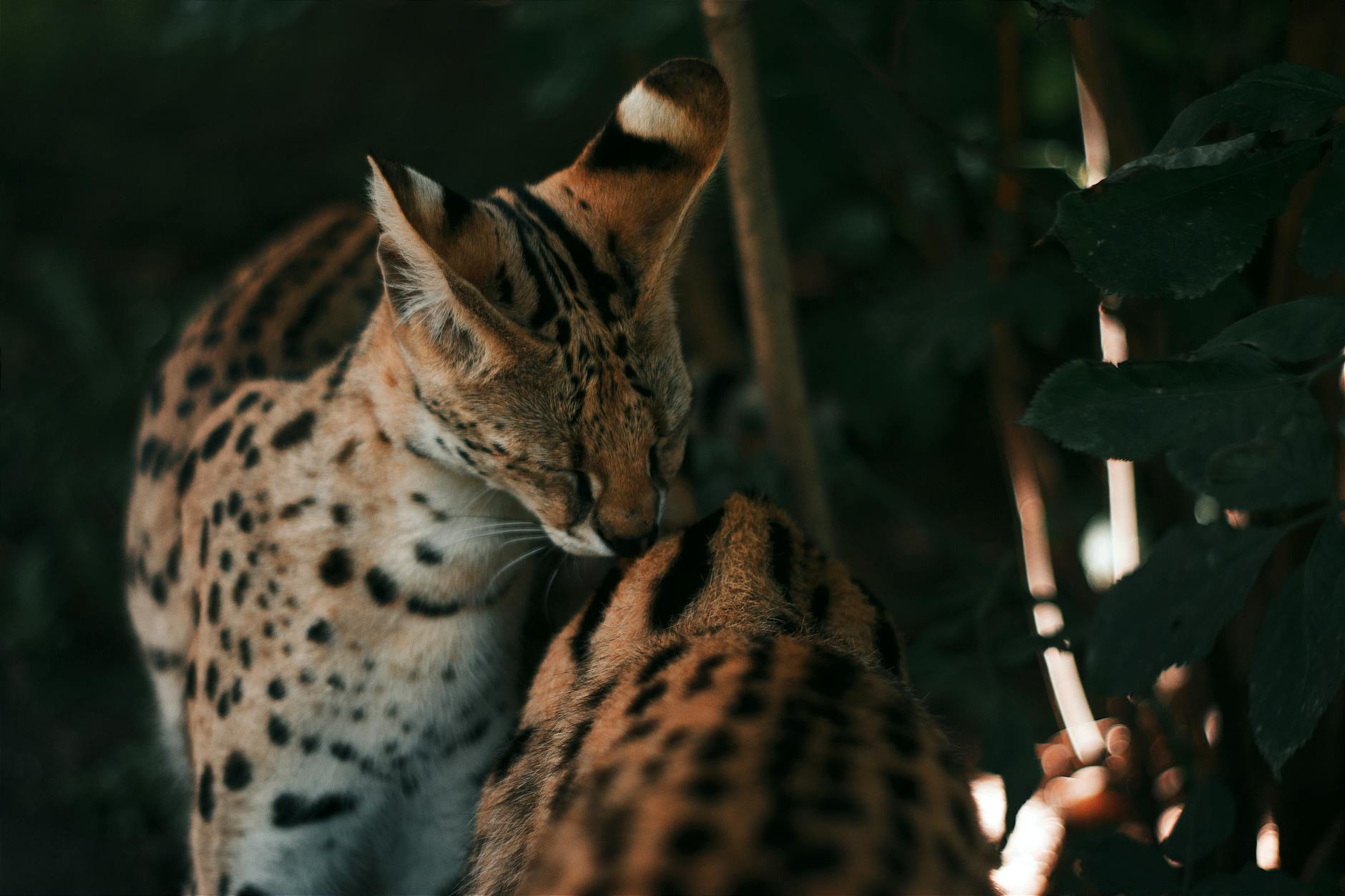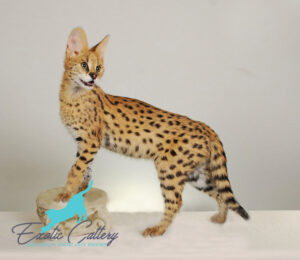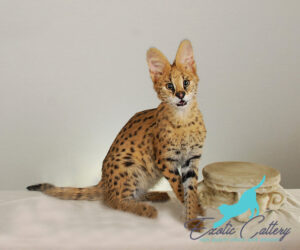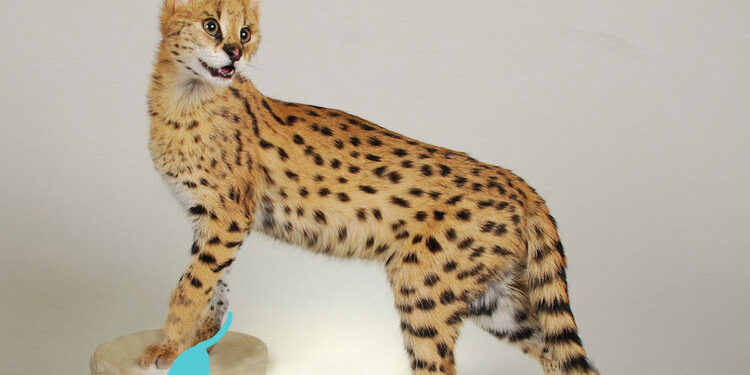Serval Cats for Sale UK: What You Need to Know Before Buying Serval Kittens
Are you fascinated by exotic felines? 🐆 The serval cat, with its striking spotted coat and long, graceful legs, has captured the hearts of many animal enthusiasts. But before you rush to search for “serval cats for sale UK,” there’s a lot you need to know about these magnificent creatures. Looking for serval cats for sale UK ? Hold up, let’s chat about what you’re getting into. These African serval cats are blowing up as exotic pets.
But owning one ain’t like picking up a tabby from the shelter. Let’s break down the real deal on serval cat ownership.

Owning a serval isn’t like having a regular house cat. These wild animals require specialized care, a deep understanding of their needs, and a significant commitment of time and resources. Is the allure of owning such a unique pet worth the challenges that come with it? From legal requirements to finding reputable breeders, the journey to serval ownership is filled with important considerations.
In this comprehensive guide, we’ll explore everything you need to know about serval cats in the UK. We’ll delve into their nature, the legal landscape surrounding their ownership, and the realities of caring for these exotic pets. Whether you’re seriously considering bringing a serval into your home or simply curious about these fascinating felines, read on to discover the ins and outs of serval cat ownership in the United Kingdom.

Understanding Serval Cats
Characteristics and appearance
Serval cats are striking felines native to Africa, known for their unique appearance and wild nature. These medium-sized cats typically weigh between 20-40 pounds and stand about 21-24 inches tall at the shoulder. Their most distinctive features include:
Long, slender legs (proportionally the longest of any cat species)
Large, upright ears
Golden-yellow coat with black spots and stripes
Short tail compared to domestic cats
Here’s a comparison of serval cats to some other feline species:
| Feature | Serval | Domestic Cat | Cheetah |
|---|---|---|---|
| Weight | 20-40 lbs | 8-10 lbs | 75-140 lbs |
| Height | 21-24 inches | 9-10 inches | 26-37 inches |
| Ears | Very large | Medium | Small |
| Coat | Spotted/striped | Various | Spotted |
Legal status in the UK
In the UK, serval cats are classified as “dangerous wild animals” under the Dangerous Wild Animals Act 1976. This classification means:
A special license is required to keep a serval as a pet
Strict regulations must be followed for housing and care
Regular inspections by local authorities are mandatory
Natural habitat and behavior
Servals are native to various African habitats, including:
Savannas
Grasslands
Wetlands
Forests (less common)
Their natural behaviors include:
Excellent hunters, especially adept at catching birds and rodents
Highly active and agile, capable of leaping up to 10 feet high
Solitary animals, typically only coming together for mating
Primarily nocturnal, with peak activity during dawn and dusk
Understanding these natural behaviors is crucial for potential serval owners, as these cats retain many of their wild instincts even in captivity. Now that we’ve covered the basics of serval cats, let’s explore the important considerations before deciding to buy one.

Considerations Before Buying a Serval
Before you decide to bring a serval cat into your home, it’s crucial to understand the unique challenges and responsibilities that come with owning this exotic feline. Let’s explore some key considerations to help you make an informed decision.
A. Potential health issues
Servals, like many exotic pets, can be prone to certain health issues:
Metabolic bone disease
Dental problems
Digestive issues
Stress-related ailments
It’s essential to find a veterinarian experienced in exotic animal care to ensure proper healthcare for your serval.
B. Exercise and enrichment
Servals are active and intelligent animals that require significant mental and physical stimulation:
Large, secure outdoor enclosure
Interactive toys and climbing structures
Daily playtime and exercise sessions
| Activity | Frequency | Duration |
|---|---|---|
| Outdoor time | Daily | 2-3 hours |
| Interactive play | 2-3 times daily | 30-45 minutes |
| Training sessions | Daily | 15-20 minutes |
C. Diet and nutrition needs
Servals have specific dietary requirements that differ from domestic cats:
High-protein diet (raw meat, whole prey)
Vitamin and mineral supplements
Fresh water always available
Avoid:
Commercial cat food
Excessive treats
Human food
D. Space requirements
Servals need ample space to thrive:
Minimum indoor living area: 20 square meters
Outdoor enclosure: At least 50 square meters
Vertical space for climbing and jumping
Separate areas for eating, sleeping, and eliminating
Now that we’ve covered these critical considerations, let’s explore the legal requirements for owning a serval in the UK to ensure you’re fully prepared for this unique pet ownership experience.
Legal Requirements for Owning a Serval in the UK
Now that we’ve considered the unique aspects of serval cats, let’s explore the legal requirements for owning one in the UK. These regulations are crucial to understand before bringing a serval into your home.
A. Insurance requirements
Owning an exotic pet like a serval comes with significant responsibilities, including mandatory insurance coverage. In the UK, you must obtain:
Public liability insurance
Specialized exotic pet insurance
These policies protect you and others in case of accidents or injuries caused by your serval. Here’s a comparison of typical coverage:
| Insurance Type | Coverage Amount | Annual Premium Range |
|---|---|---|
| Public Liability | £1-5 million | £100-£500 |
| Exotic Pet | £2,000-£10,000 | £200-£1,000 |
B. Microchipping and registration
To ensure proper identification and tracking of servals in the UK:
Microchipping is mandatory
Registration with local authorities is required
Annual updates of contact information must be maintained
C. Licensing and permits
Owning a serval in the UK requires specific licenses and permits:
Dangerous Wild Animals (DWA) license from your local council
CITES (Convention on International Trade in Endangered Species) permit for international transport
The DWA license involves:
Annual inspections of your premises
Proof of adequate enclosures and safety measures
Veterinary health certificates
These legal requirements are designed to ensure the safety of both the serval and the public. Next, we’ll explore how to find reputable serval breeders in the UK who can guide you through this complex process.
Finding Reputable Serval Breeders in the UK
Now that you understand the legal requirements for owning a serval in the UK, it’s crucial to find a reputable breeder. This step is essential to ensure the health and well-being of your future exotic pet.
Red flags to watch out for
When searching for serval breeders, be aware of these warning signs:
Unusually low prices
Reluctance to show breeding facilities
Lack of proper documentation
Pressure to buy immediately
Limited knowledge about serval care
Questions to ask potential breeders
To assess a breeder’s credibility, consider asking the following:
Can you provide health certificates for the servals?
What’s your breeding experience with servals?
Do you offer post-purchase support?
Can I visit your facility before making a decision?
What diet do you recommend for servals?
Researching breeders
Thorough research is crucial when finding a reputable serval breeder. Here are some steps to follow:
Check online reviews and testimonials
Consult exotic pet forums for recommendations
Verify breeder credentials with relevant authorities
Request references from previous buyers
| Research Method | Advantages | Disadvantages |
|---|---|---|
| Online reviews | Easy access, multiple perspectives | Potential fake reviews |
| Pet forums | Experienced community insights | May be biased opinions |
| Authority verification | Official credibility check | Limited information available |
| Previous buyer references | Direct experience feedback | Potentially curated responses |
By following these guidelines and conducting thorough research, you’ll be better equipped to find a reputable serval breeder in the UK. Next, we’ll explore the costs associated with owning a serval cat.

Cost of Owning a Serval Cat
Owning a serval cat is a significant financial commitment that extends far beyond the initial purchase price. Let’s break down the various costs associated with serval ownership:
A. Veterinary costs
Servals require specialized veterinary care, which can be quite expensive. Here’s a breakdown of potential veterinary expenses:
Annual check-ups: £200-£300
Vaccinations: £100-£150 per year
Emergency visits: £500-£1000+ per incident
It’s crucial to find an exotic pet veterinarian experienced in treating servals, which may be challenging in some areas of the UK.
B. Ongoing care expenses
Daily care for a serval involves several recurring costs:
| Expense | Monthly Cost |
|---|---|
| High-quality diet | £150-£200 |
| Supplements | £30-£50 |
| Toys and enrichment | £50-£100 |
| Litter and cleaning supplies | £40-£60 |
Additionally, you’ll need to factor in the cost of a large, secure outdoor enclosure, which can range from £2,000 to £5,000 or more, depending on size and materials.
C. Initial purchase price
The initial cost of a serval cat in the UK can be substantial:
Serval kitten: £5,000-£10,000
Adult serval: £3,000-£7,000
Prices may vary depending on the breeder, the cat’s age, and its lineage. It’s important to note that cheaper options often come with increased risks, such as health issues or questionable breeding practices.
When considering a serval as a pet, it’s essential to factor in these long-term costs. The total annual expense of owning a serval can easily exceed £5,000, not including any unexpected veterinary emergencies or specialized equipment needs. Next, we’ll explore how to prepare your home for this unique and demanding pet.
Preparing Your Home for a Serval
Now that you’ve considered the legal requirements and costs associated with owning a serval, it’s time to focus on preparing your home for this exotic feline. Servals are active, curious, and agile animals that require a specially adapted living environment to ensure their safety and well-being.
A. Serval-proofing your living space
Servals are excellent climbers and jumpers, capable of reaching high places with ease. To serval-proof your home:
Install secure locks on windows and doors
Remove or secure fragile items and potential hazards
Cover electrical cords and outlets
Use child-proof latches on cabinets and drawers
B. Essential equipment and supplies
Equipping your home with the right gear is crucial for your serval’s comfort and safety. Here’s a list of must-have items:
Large, multi-level enclosure
Sturdy scratching posts
Interactive toys and puzzles
High-quality, species-appropriate food
Large litter boxes
Water fountains or bowls
C. Creating a safe environment
Servals need a stimulating yet secure environment. Consider the following:
| Feature | Purpose |
|---|---|
| Climbing structures | Satisfy natural climbing instincts |
| Hiding spots | Provide security and privacy |
| Outdoor enclosure | Allow safe outdoor access |
| Temperature control | Maintain comfortable living conditions |
Remember, servals are wild animals and require significantly more space and enrichment than domestic cats. Creating a safe, engaging environment is essential for their physical and mental well-being.
Next, we’ll explore some alternatives to owning a serval for those who may not be ready for the commitment of this exotic pet.
Alternatives to Owning a Serval
Now that we’ve explored the challenges and responsibilities of owning a serval cat, let’s consider some alternatives that can satisfy your love for exotic felines without the legal and practical complications.
A. Supporting serval conservation efforts
Instead of owning a serval, you can make a significant impact by supporting conservation organizations dedicated to protecting these magnificent cats in their natural habitats. Here are some ways to get involved:
Donate to reputable wildlife conservation groups
Sponsor a serval through a wildlife sanctuary
Volunteer at local zoos or wildlife centers that house servals
Raise awareness about serval conservation through social media
B. Other exotic cat breeds
If you’re drawn to the unique appearance of servals, consider these exotic cat breeds that are more suitable for domestic environments:
| Breed | Appearance | Temperament |
|---|---|---|
| Bengal | Spotted coat, wild look | Active, playful |
| Ocicat | Spotted coat, muscular build | Social, dog-like |
| Egyptian Mau | Spotted coat, athletic build | Energetic, loyal |
| Toyger | Striped coat, tiger-like appearance | Friendly, outgoing |
C. Serval hybrids (e.g., Savannah cats)
Savannah cats, a hybrid between servals and domestic cats, offer a compromise between exotic looks and domesticated behavior. Key points to consider:
Savannahs have a wild appearance similar to servals
They are more adaptable to domestic life than pure servals
Earlier generations (F1, F2) retain more wild traits
Later generations (F4 and beyond) are more suitable as pets
Legal restrictions may still apply, so check local regulations
By exploring these alternatives, you can satisfy your fascination with exotic cats while ensuring responsible and ethical pet ownership.

Owning a serval cat in the UK is a significant commitment that requires careful consideration. From understanding their unique needs to navigating legal requirements and finding reputable breeders, prospective owners must be well-informed and prepared. The cost of ownership, both financially and in terms of time and effort, is substantial and should not be underestimated.
Before making a decision, it’s crucial to evaluate whether a serval is truly the right pet for you. Consider exploring alternatives such as domestic cat breeds with wild-looking coats or supporting serval conservation efforts instead. Whatever choice you make, prioritize the well-being of these magnificent creatures and ensure you can provide them with the care and environment they need to thrive.

Serval Cats for Sale
Are Serval Cats Legal Where You Live?
Before you start Googling “serval cat breeders near me”, pump the brakes.
The U.S. Fish and Wildlife Service has some thoughts on exotic pet ownership.
Laws on legal exotic pets vary wildly from state to state, even city to city.
Some places say “no way”, and others want a stack of permits.
The Exotic Pet Trade Association might help you navigate the red tape.
But remember, laws change faster than a serval can pounce.
Serval Cat Care: Not Your Average Kitty Litter
Forget everything you know about house cats.
Serval cat care requirements are a whole new ballgame.
These cats need space – like, a lot of it.
Think custom-built indoor-outdoor enclosures with room to sprint and climb.
Their diet? Raw meat, whole prey, and specially formulated exotic cat food.
Forget the Friskies, we’re talking premium stuff here.
Are Serval Cats Dangerous?
Let’s talk about serval cat temperament.
These aren’t cuddly lap cats – they’re wild animals at heart.
Servals can be affectionate, but they’ve also got a wild streak a mile wide.
They’re strong, and fast, and come equipped with claws and teeth built for hunting.

Serval Cat Ears
The Ethics of Exotic Pet Ownership
Here’s where it gets sticky.
The exotic pet trade is controversial, to put it mildly.
CITES (Convention on International Trade in Endangered Species) has strict rules on serval trade.
Some argue keeping servals as pets helps conservation efforts.
Others say it’s cruel to keep these wild cats in captivity.
There’s no easy answer, but it’s something to chew on.
Hybrid Options: When Full Serval is Too Much
If a full serval seems overwhelming, there are alternatives.
F1 Savannah cats are serval-domestic cat hybrids.
They’re still exotic, but a bit more manageable for the average home.
Check out our F2 Savannah cats for a more “domesticated” option.
Caring for Your Serval: It’s a Full-Time Gig
Owning a serval isn’t a casual hobby.
These cats need serious enrichment to stay happy and healthy.
We’re talking puzzle feeders, climbing structures, and lots of interactive play.
You’ll need to find an exotic vet – your regular cat doc won’t cut it.
Serval cat enrichment is crucial to prevent boredom and destructive behavior.
The Bottom Line on Serval Cats as Pets
Servals are stunning creatures, no doubt.
But they’re not for everyone – or even most people.
They need specialized care, tons of space, and owners willing to adapt their lives.
If you’re still set on it, do your homework.
Talk to experienced owners, visit exotic animal sanctuaries, and think it through.
Responsible pet ownership is key, especially with exotic animals like servals.
Remember, a serval is a lifelong commitment – they can live up to 20 years in captivity.
Before you buy, consider the serval cat lifespan and if you’re ready for that long-term responsibility.
Serval cats for sale might catch your eye, but make sure you’re ready for the reality behind the exotic allure.

Serval Cat Weight
Living with a Serval: The Daily Reality
Alright, let’s dive into the nitty-gritty of serval cat ownership.
You’ve done your homework, you’re ready for the challenge.
Now, what’s life like with one of these spotted felines in your home?
How Big Do Serval Cats Get?
First up, let’s talk about serval cat size.
These aren’t your average house cats – they’re wildcats on a diet.
Adult servals can weigh anywhere from 20 to 40 pounds.
They stand about 21-24 inches at the shoulder.
Curious about specifics? Check out our guide on serval cat weight.
That’s a lot of cats to handle, both physically and mentally.
Serval Cats for Sale UK
Forget what you know about cat-proofing for domestic breeds.
Servals are stronger, faster, and way more curious.
Anything not nailed down is a potential toy or snack.
Breakables? Kiss ’em goodbye or lock ’em up tight.
Your couch might become a scratching post if you’re not careful.
The Serval Diet: Hope You Like Grocery Runs
Feeding a serval isn’t as simple as opening a can of cat food.
These cats need a diet that mimics their wild eating habits.
We’re talking whole prey items – mice, rats, quail, you name it.
Others go for high-quality exotic cat kibble mixed with raw.
Either way, it’s pricier and more complex than feeding Fluffy.
Exercise and Playtime: Hope You’re in Shape
Servals have energy for days and need tons of exercise.
We’re talking multiple play sessions daily, each lasting 30 minutes or more.
Toys need to be tough and varied to keep them interested.
Puzzle feeders are great for mental stimulation.
A bored serval is a destructive serval, so keep ’em busy.
Do Serval Cats Use a Litter Box?
Good news – servals can be litter trained.
Bad news – you’ll need a jumbo-sized box (or several).
And forget clay litter – these cats dig deep and fling it everywhere.
Many owners opt for natural substrates like wood pellets or sand.
Be prepared for some trial and error in this department.
The Social Life of a Serval Owner
Owning an exotic pet can impact your social life.
Not everyone’s cool with a wildcat in the house.
Finding pet sitters for vacations? Good luck with that.
You might need to skip those weekend getaways.
Vet Care: Not Your Average Check-Up
Finding a vet for your serval can be tricky.
Not all vets are equipped to handle exotic cats.
You might need to travel for specialized care.
Regular check-ups are crucial, as servals can hide illness well.
Expect higher vet bills than you’d have with a domestic cat.
The Legal Landscape: Always Shifting
Remember those permits we talked about?
Keep an eye on changing laws and regulations.
What’s legal today might not be tomorrow.
Some areas require regular inspections of exotic pet homes.
Stay connected with exotic pet ownership communities for updates.
Alternatives to Ownership: Supporting Servals from Afar
If all this sounds overwhelming, there are other ways to appreciate servals.
Consider “adopting” a serval at a reputable sanctuary.
You can support conservation efforts for wild servals.
Or, if you’re set on ownership, look into Savannah Cats.
These serval hybrids offer some wildcat traits in a more manageable package.
Check out our F4 Savannah cats for a taste of serval without the full commitment.
FAQs About Serval Cats
Q: Can serval cats be domesticated? A: Not fully. While they can bond with humans, servals retain wild instincts.
Just remember, these are wild animals at heart.
Respect their nature, and be ready for a wild ride.
Serval cats for sale might catch your eye, but make sure you’re truly ready for the reality of exotic pet ownership.







